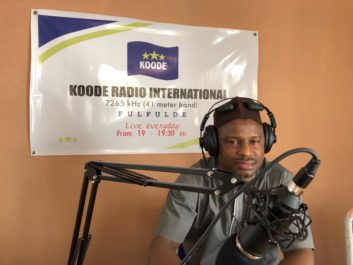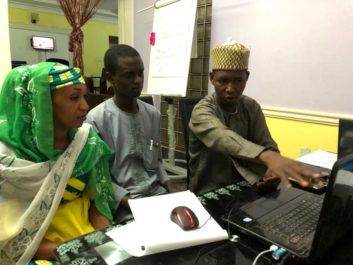ABUJA, Nigeria — Koode Radio International, a new shortwave program with considerable goals, has begun broadcasting to much of Western Africa.
With programs in the Fulani (or Fula) language, KRI aims to “educate, enlighten and entertain” its listeners, the Fulbe people. This predominantly Muslim, nomadic herder and farmer group is spread across Africa from Senegal in the west to Lake Chad in the east. Dialects of the language are spoken in some 20 countries and the station chose the name “Koode” because it means “star” in all of the dialects.

While some Fulbe are able to communicate via the likes of WhatsApp and Facebook, others cannot. Because a number of Fulbe are herders, they are not only beyond the range of the internet, but beyond the range of electricity.
RADIO IS VITAL
Radio is paramount for them. “A well-decorated portable radio is often part of a dowry,” explains Usman Shehu, the founder of KRI. But not just any radio. Given the distances involved, only shortwave can reach the Fulbe herders.
There are tens of millions of Fulbe, but there are no Western news broadcasters who provide programs in the language, although Adventist World Radio does have religious broadcasts in Fulani. KRI, thus, rose to the challenge and started online broadcasts last April while it requested funding from potential donors. When none was forthcoming, KRI took out a loan with a German bank and began shortwave transmissions in late December.

The initial broadcasts took place for 30 minutes a day using 100 kW of power from a shortwave site in Issoudun, France. The station subsequently increased the power to 250 kW in late February in order to reach a wider audience.
KRI airs educational programs on issues pertaining to agriculture, health, and civics as well as programs specifically for women and young people. The station is also working for peace in two conflicts.
OBJECTIVES
One objective is to reduce the recruitment of Fulbe people into the ranks of extremist groups, such as Boko Haram. The other is to ease the ongoing contention between herders and farmers. And while the conflict with Boko Haram is well known, the latter struggle actually claims more lives, according to the International Crisis Group.
“One of the main reasons of deadly conflicts between farmers and herders is the environmental factor,” explains Shehu. KRI aims to educate herders about climate change and work toward developing coping mechanisms for peaceful co-existence.
[Read: Does Shortwave Have a Future]
If they can secure the funding, KRI hopes to expand to two hours a day using 500 kW of power. An increase in hours will make it easier for this rising star to achieve its goal of becoming the number one radio station for the Fulbe people across the continent.
Hans Johnson has worked in the shortwave industry for over 20 years in broadcast sales and frequency management.